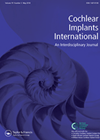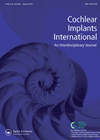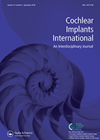
Journal Reviews
How interaural level differences differ between children with bilateral cochlear implants and their normally-hearing peers
A group in the Netherlands investigated interaural level differences (ILDs) in children who were bilaterally implanted with cochlear implants (CIs) and compared their performance to their normally-hearing peers. ILDs are used to localise sound and rely on the high-frequency cues....
Effect of stimulation levels on speech recognition and auditory threshold performance
When programming a Cochlear® device, two measurements are normally assessed. T levels relate to the quietest sound the CI user can hear i.e. thresholds, and C levels are comfortable levels which are tolerable for the CI user. If these levels...
Quality of life in adolescence
Adolescence can be a difficult time and the added complexity of a hearing loss can exacerbate feelings during this period. In the literature, there are mixed findings that show while some children with hearing loss score poorly on some aspects...
Which cross-over frequency is best for electro-acoustic stimulation?
Advances in technology and improved soft surgical techniques have led to individuals with better hearing thresholds, especially at the low frequencies, becoming candidates for cochlear implants (CI). Surgeons are more confident that residual hearing can be preserved thus making those...
Auditory deprivation and single-sided deafness
In cases of bilateral auditory deprivation, there is clear evidence of an inverse relationship between performance after cochlear implantation and the length of severe to profound deafness prior to implantation (i.e. the longer the deprivation the poorer the outcome on...
Milestones profile for children with cochlear implant
Over the last eight years, Nottingham auditory implant programme have developed and validated a profile of auditory milestones for use with children receiving bilateral cochlear implants under the age of two years. The structure of the Nottingham Auditory Milestones profile...








